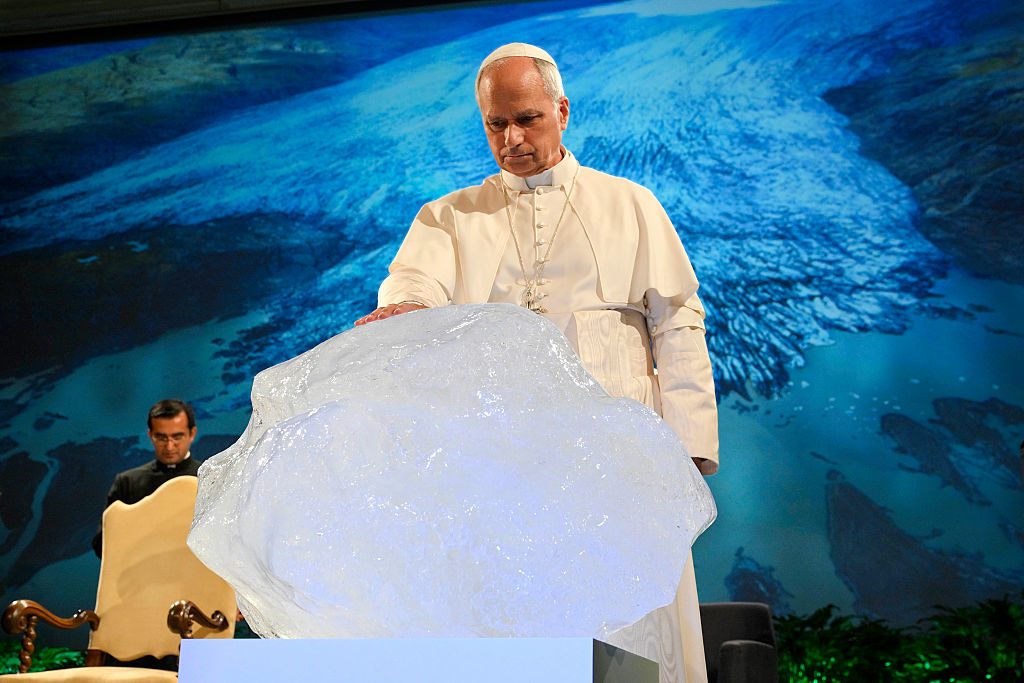Barely six months into his reign, Pope Leo XIV is already facing backlash. The attacks are coming from mad trads and conservative Catholics who seem to measure their faith by the rage they can muster at the Church hierarchy. Leo’s “crime” in this instance was blessing a block of ice at a climate change event at the Vatican, and then criticising those who “ridicule” discussion of global warming. Yet the blessing was a perfectly orthodox gesture, inspired by the same social concern that animated his predecessors.
“Horrific,” fumed The Daily Wire’s Matt Walsh. “The whole thing. Pope Leo blesses a block of ice and then stands there while these communist freaks do some kind of weird pagan Earth-worshipping hippy ritual.” He added: “The leader of the Catholic Church shouldn’t be anywhere near this nonsense. What the hell are we doing here?” Scores of other Right-wing voices chimed in with similar complaints.
There was nothing “pagan” or “communist” or “Earth-worshipping” about the Spanish-language song that followed the blessing. Its title and refrain is Loado Seas, Oh Mi Señor, or “Praised Be You, Oh My Lord.” Inspired by a prayer of Saint Francis of Assisi, the lyrics give thanks to God “for all your creatures, for the sun and the moon.” Laudato si’ — the Italian rendition of the same phrase — was the title of Pope Francis’s 2015 encyclical on “care for our common home”.
Nor was there anything novel or strange about the blessing of the ice block. The “Blessing of Pasture, Meadows, and Fields” is one of the standard prayers of a church that dates back to pre-modernity and whose founder used pastoral and agrarian metaphors to convey much of his teaching: living vines, mustard seeds, mountains moved by faith, and so on.
Behind these gripes lies a common misconception among many Anglophone Right-wing Catholics, who believe the Church’s concern with issues such as economic justice or the environment represents a deviation from its mission of saving souls. They want the hierarchy to speak out against abortion and gender ideology, but they recoil when popes address issues typically associated with the Left in the conventional partisan divide.
Yet the Church rejects the disintegration of life’s various realms and insists, instead, on their proper ordering in relation to one another. The Catholic tradition teaches that you can’t neatly sever politics from metaphysics, the economy from morality, culture from spirituality, and salvation from how we treat the planet.
Starting from this premise, the Church has intervened in the crises of modern life long before Leo blessed the ice. In 1891, Pope Leo XIII published Rerum novarum in response to industrial capitalism. In it, he rejected socialism, even as he called for a Christian-democratic political economy characterised by living wages and strong labour unions.
In 1937, amid the rise of Nazism, Pope Pius XI denounced racism and antisemitism in Mit brennender Sorge, notably offering the encyclical in German, rather than the typical Latin. And in 1963, in Pacem in terris, Pope John XXIII called for American and Soviet leaders to abandon nuclear weapons and the insane logic of mutually assured destruction.
The temporal common good has always been on the Vatican’s radar, and it hasn’t been shy about exercising its broad authority on “faith and morals” to propose policies and social arrangements that uphold the dignity and wellbeing of human life. The same worldview that impels popes to speak out against abortion and euthanasia also demands social justice and careful stewardship of the planet. A Church that ignored these other concerns couldn’t fulfil its mission.











Join the discussion
Join like minded readers that support our journalism by becoming a paid subscriber
To join the discussion in the comments, become a paid subscriber.
Join like minded readers that support our journalism, read unlimited articles and enjoy other subscriber-only benefits.
Subscribe